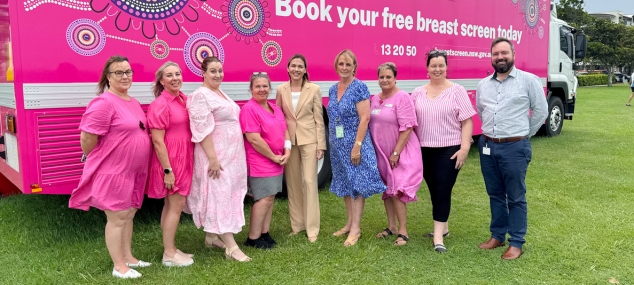
OFFICIAL FROM:
Ryan Park, Minister for Health, Minister for Regional Health
A new permanent BreastScreen NSW screening van will rejoin the North Coast fleet ensuring women of the North and Mid North Coast communities have continued access to two mobile clinics.
The van will replace the vehicle which was on loan after the region’s mobile service was destroyed during the February 2022 floods. It will provide a purpose built, specialised mammography service on wheels to support women to access life-saving screening closer to home.
The vehicle features specially commissioned Aboriginal artwork, by proud Kamilaroi and Jerrinja woman, Jasmine Sarin. Ms Sarin’s ‘Biyani’ artwork was commissioned specifically for BreastScreen NSW, with the name ‘Biyani’ being a Dharawal word to describe a curative operation performed by women to cure illness in other women.
For women aged 50-74 years, a breast screen every two years is the best way to detect breast cancer early, before it can be seen or felt. The service is available for women aged from 40 years.
Aboriginal women are recommended to screen every two years from age 40.
Each year, around 34,000 women access BreastScreen services across the North and Mid North Coast, with the two mobile screening vans providing an essential alternative for women who are not able to travel to one of the four fixed clinics.
To book a mammogram with BreastScreen NSW, call 13 20 50 or visit BreastScreen NSW – Online booking.
Any woman who has noticed a change in their breasts, like a lump, should see their GP without delay. Any woman with a family history of breast cancer should discuss their specific needs with their GP.
Quotes attributable to Minister for Regional Health, Ryan Park:
“Breast cancer is the most common cancer in women with age and being female the biggest risk factors – not family history.
“Early detection is the key with breast cancer, and a mammogram is one of the most important things women between the ages of 50 – 74 can do for their health.”
Quotes attributable to Labor Spokesperson for Ballina, Emily Suvaal MLC:
“This van will ensure continuity of breast screening services for thousands of women living in the North and Mid North Coasts of NSW.
“I know life gets busy, but I urge women who are due for their breast screen to take the time from their day to make a booking. A breast screen is quick and easy and could save your life.”
Quotes attributable to NSW Chief Cancer Officer and CEO of the Cancer Institute NSW, Professor Tracey O’Brien AM:
“More than 6500 women in NSW are expected to receive a breast cancer diagnosis this year, and 1,000 women are expected to lose their lives to the disease.
“We need to do everything we can to support all women, regardless of where they live to access a potentially life-saving breast screen.”
Quotes attributable to BreastScreen NSW North Coast Acting Director, Patrick Magee:
“Detecting breast cancer early increases your chance of survival while reducing the likelihood of invasive treatment, such as mastectomy or chemotherapy.”